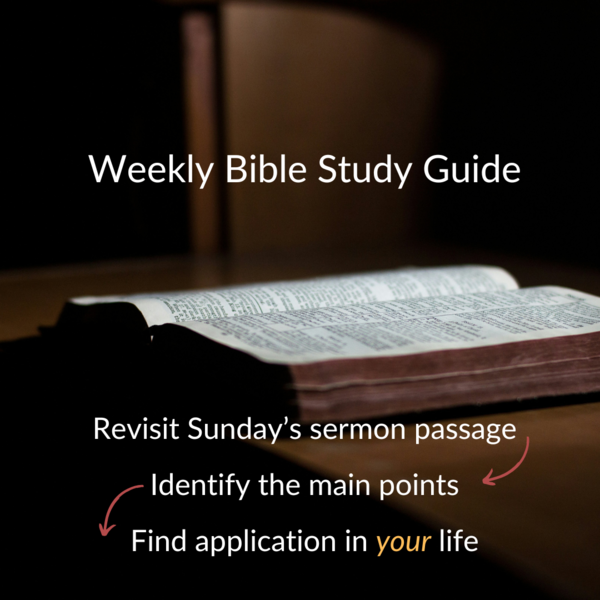|
|

|
How to use the Bible Study Guide:
1. Pray. Ask the Lord to open your eyes, that you might behold wondrous things out of his Law (Ps. 119:18). 2. Read Sunday's passage. Feel free to read it more than once, or in another translation. 3. Review the sermon outline. Try to see how the points came out of the text. 4. Answer the questions below. Focus on personal application. 5. Pray. Praise and thank the Lord, then ask him to work in mighty ways.
Remember, we live not by bread alone, but by every word which proceeds from the mouth of God (Dt. 8:3; Mt. 4:4). |

|
The Passage: John 1:43–51 ESV
43 The next day Jesus decided to go to Galilee. He found Philip and said to him, “Follow me.” 44 Now Philip was from Bethsaida, the city of Andrew and Peter. 45 Philip found Nathanael and said to him, “We have found him of whom Moses in the Law and also the prophets wrote, Jesus of Nazareth, the son of Joseph.” 46 Nathanael said to him, “Can anything good come out of Nazareth?” Philip said to him, “Come and see.” 47 Jesus saw Nathanael coming toward him and said of him, “Behold, an Israelite indeed, in whom there is no deceit!” 48 Nathanael said to him, “How do you know me?” Jesus answered him, “Before Philip called you, when you were under the fig tree, I saw you.” 49 Nathanael answered him, “Rabbi, you are the Son of God! You are the King of Israel!” 50 Jesus answered him, “Because I said to you, ‘I saw you under the fig tree,’ do you believe? You will see greater things than these.” 51 And he said to him, “Truly, truly, I say to you, you will see heaven opened, and the angels of God ascending and descending on the Son of Man.” |

|
"Come and See" Sermon Outline
Intro: There are two questions which our passage answers for two different groups of people: (1) How can believers be confident when they share Jesus with others? And (2) how can non-believers be confident that the Jesus they've been told about is real? We turn to John 1:43-51 to find out. Looking first at Philip, we see that... I. Found people find people (v. 43–46). Having been found by Jesus, Philip goes out to find Nathanael. He is a great example of Christian evangelism. If we have been found by Jesus, we should go out to find others for Jesus. Many of us struggle with this because we fear rejection or humiliation. We don't want to face a response like Nathanael gave Philip ("Can anything good come out of Nazareth?"), which makes our faith seem foolish. People often make fun of the truth claims of Christianity. Yet the Bible tells us to expect that it will sound foolish to some. As Paul says, the message of Christ crucified is a stumbling block to some, and foolishness to others, yet to those who are being saved, it is the wisdom and power of God (see 1 Corinthians 1:18–25). So don't worry about sounding foolish; worry about staying faithful. Because found people find people. II. Those who come and see Jesus eventually discover that Jesus saw them first (v. 47–49). Look at what Philip does next. He doesn't try to answer all of Nathanael's objections, or give reasons or evidence. He just says, "Come and see." The truth is, no amount of evidence or reasoning can make a person believe. We need to have a personal encounter with Jesus. So, like Philip said, if you don't yet believe in Jesus, you should simply come and see! If you do, you will discover what believers know: that just like Nathanael, long before we ever saw Jesus, He saw us first. He knew us. All of us, both the good and the bad. And yet he loved us and laid his life down for us. If Jesus is still unknown to you today, know this: you are not unknown to him. By faith, come and see Jesus, and the message that once sounded foolish will become the wisdom and power of God for your salvation. Now, we pull everything together and see what this passage, and indeed what John 1, is really all about. III. As unlikely as it may seem, Jesus of Nazareth really is the way from earth to heaven (v. 50–51). Jesus gives his first of 25 "truly, truly" statements in the Gospel of John, and this one concerns two Old Testament prophecies which he fulfills. He is the divine "Son of Man" of Daniel 7, and he is "Jacob's ladder" connecting heaven and earth from Genesis 28. The reference to Daniel 7 serves as a bookend, connecting us all the way back to verse 1, which introduces Jesus' divine identity. Since verse 1, John has continued his astonishing claims about Jesus. It's as if he's saying, "If you are surprised that the Messiah is a nobody from nowhere (Nazareth), then get ready to be amazed, because you're just scratching the surface." Count up all the truth claims about Jesus, or titles given to Jesus, in John 1, and let them all overwhelm you. They're meant to. And now ask yourself: why should anyone beleive that an early first-century Jewish man from Nazareth is the Son of God and Savior of the world, the bridge between heaven and earth, and the only way to God? Isn't it just a silly story? And then pause a moment, and consider John's simple, yet profound answer: because it's true. Conclusion: Has the Gospel sounded silly in the past, but something in you is starting to change? Then come and see. Believe in Jesus, and upon him, you will ascend into glory. |

|
Questions
1. Obstacles we face when attempting to "find" people. - Which parts of Christianity – doctrines, beliefs, practices – do people often object to? Why do they object? - Are there any parts of Christianity that you have found difficult to believe? Which ones? Why do you think it's hard to believe them? - If faith in Jesus has ever seemed foolish to you, what changed in you? - Read 1 Corinthians 1:18–25. - How does it impact your outlook on evangelism, knowing that some people are going to think the Gospel is foolish? - How does it impact your outlook on evangelism, knowing that other people are going to find the Gospel to be the very power of God unto salvation? - Are you capable of making someone believe in Jesus? Why or why not? - What then is really the role of the believer in evangelism? - If you are a Philip (a believer), who is your Nathanael (someone who doesn't believe yet)? How can you "find" them?
2. Jesus knows us. - Have you had a moment like Nathanael, when you realized that Jesus truly knew you, even before you knew him? - Before you knew Jesus, what did you think He thought about you? - Now, what do you think Jesus thinks about you? - When did the truth of the Gospel become clear for you? How did it impact or change you? - How do we know God loves us?
3. As unlikely as it sounds, Jesus really is... - Complete that sentence with different truth claims or titles from John 1. "As unlikely as it sounds, Jesus really is _________________." Keep doing this until you run out of things to say. - How could you invite a skeptic to "come and see" Jesus? What activities could you do with them? - What will you do if this skeptic thinks the Gospel is foolish? - How will you remind yourself that while it may sound foolish to some, it is in fact the wisdom and power of God for all who are being saved? |

|
Prayer
1. Praise God that we have been found by Jesus. Thank him for every detail of your conversion. 2. Thank Jesus that he has sent us out to "find" others. 3. Ask Jesus to keep you from worrying about sounding foolish, and instead to worry about staying faithful. 4. Thank God for making us, knowing us, loving us, saving us. 5. Ask God to soften the hearts of every "Nathanael" in your life, that what once sounded foolish, would become for them the words of eternal life. |

|
Thanks
Thanks for reading the Bible Study Guide! I pray it helps us "continue to grow up in every way into him who is the head, into Christ" (Eph. 4:15).
Sincerely, your brother in Christ, Tom Hansen, Senior Pastor |
